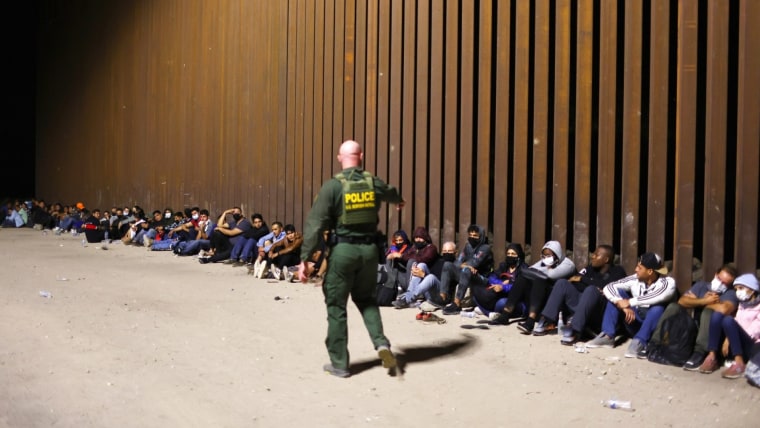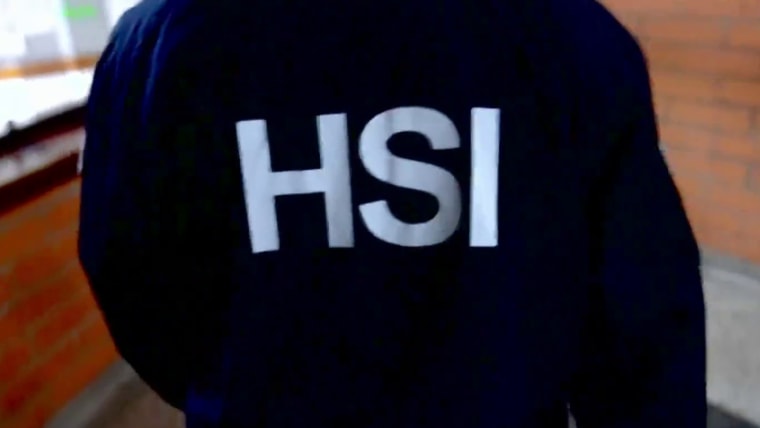
Despite new restrictions on asylum-seekers, daily migrant crossings at the U.S.-Mexico border have remained near record highs, say three sources familiar with the latest numbers, as the Biden administration braces for a possible extra surge of thousands more per day when Covid restrictions end this month.
Since it was imposed by the Trump administration in March 2020, the Covid protocol known as Title 42 has led Customs and Border Protection to turn back migrants crossing the border more than 2.4 million times, according to CBP data.
A federal judge in Washington, D.C., ruled recently that the Biden administration must lift Title 42 by midnight Dec. 21, although some Republican-run states have asked courts to block the ruling. Policymakers in Washington, as well as officials at the southern border, have long predicted a surge in migrants when the policy is lifted. They have warned about backlogs and overcrowding in border processing centers, as well as funding shortfalls.
In October, the U.S. began using Title 42 to turn away Venezuelan border crossers, whose numbers were soaring. They had previously been exempt. As of Oct. 24, just days after the policy was enacted, there was an 80% drop in Venezuelans crossing the border. According to new numbers that have not yet been made public, however, the policy did not depress the overall daily total of migrants crossing. New nationalities, including Mexicans and Central Americans, took the place of the Venezuelans.
CBP agents and officers are now apprehending migrants 7,500 to 8,000 times a day, the sources familiar with the data said, which is at or close to the record levels before Venezuelans became subject to Title 42. The sources said estimates of the extra number of migrants who might cross daily when Title 42 ends approach 2,500, meaning daily apprehension totals might hit 10,000.
Two sources familiar with internal discussions at the Department of Homeland Security and the White House said that while many ideas have been considered to combat what could be an even bigger surge in border traffic, there is no “serious planning” around any idea to limit asylum-seekers from coming into the U.S.
A DHS spokesperson said the Biden administration’s Venezuela policy has been effective at curbing Venezuelans, even if other nationalities have kept overall border numbers high.
“The Venezuelan migration enforcement process announced on Oct. 12 has substantially reduced attempted irregular entries of Venezuelans at the southwest border — from 1,100 a day on average the week before the announcement to around 100 a day on average this week,” the spokesperson said, adding that the administration inherited a “gutted” immigration system from the previous administration.
When Title 42 lifts, migrants of all nationalities will be able to come into the U.S. to make asylum claims, just as they did before the Covid-19 pandemic.
Homeland Security Secretary Alejandro Mayorkas has previously detailed plans for lifting Title 42 that would allow for a faster asylum process that would move to quickly deport those who do not qualify. However, former Biden administration officials have said the plan would need more funding to scale up to address the number of asylum-seekers expected to cross the border when Title 42 lifts.
Venezuelans at the border
Venezuelans and some other nationalities, including Cubans and Nicaraguans, had been exempt from expulsions from the U.S. under Title 42, in large part because of their countries’ reluctance to take deportees back. Under a deal the U.S. and Mexico struck in October, Venezuelans began to be turned back into Mexico rather than allowed to claim asylum. The agreement was accompanied by a new policy allowing up to 24,000 Venezuelans to apply to live and work in the U.S. if they could find U.S.-based sponsors.
Until then, Venezuelans were the fastest-growing nationality of undocumented border crossers entering the U.S., and they filled many of the buses Republican governors were sending to Democratic-run cities such as New York, Washington and Chicago.
Since the U.S. began turning them back across the border, Venezuelans stuck in Mexico have clashed with authorities who dismantled their camps and threw their belongings into garbage trucks, leaving them with nothing and nowhere to go.
Carrie Filipetti, a former deputy assistant secretary for Cuba and Venezuela at the U.S. State Department, said the U.S. should not focus its policies toward Venezuela solely on limiting immigration but rather on addressing the human rights abuses of the Venezuelan government.
“To keep legal immigration and asylum-seekers from safely coming to the U.S. is concerning from a humanitarian perspective.”

 Latest Breaking News Online News Portal
Latest Breaking News Online News Portal






